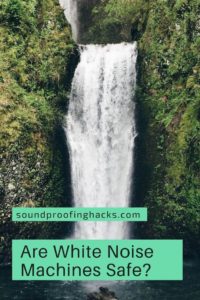Are White Noise Machines Safe? Find Out If You Should Be Using Them
I first came across white noise machines a few years ago when a friend introduced them to me. At that point, I really couldn’t understand its use and benefits, or maybe I just couldn’t be bothered to find out, but recently, I chanced upon them again and this time, I wanted to know more. Are white noise machines safe?

If you have never heard one before, you would be somewhat surprised when you get your first one. It isn’t limited to just one sound, but actually any sound that has a constant intensity. Think rain drops falling, fan blowing, or the humming air conditioner.
Most people use it for sleeping, and the basic logic behind it is that white noise provides a calm and steady “distraction” to help you sleep. Environmental sounds, neighbors and the traffic outside can all cause you difficulty in sleeping, so that’s where a white noise machine comes into the picture.
It lets you “focus” on only one steady noise, which lets you sleep better.
Let’s dive in a bit deeper to see what else is there about white noise machines and if they can be used safely.
I am an Affiliate for Amazon and others, which means I may make a commission if you purchase something through the links here. There is NO extra cost to you at all, and THANK YOU so much for the support. Learn more here.
Contents: Skip to section
What is white noise?
What comes to your mind when you hear the word ‘white noise’? Most probably the sound of ocean, rain, static television or radio, etc. (or maybe nothing if you are new to this word!). But, it’s more than that.
White noise refers to any sound that has the same amplitude at all frequencies. In simpler words, it is the sound produced by combining all the frequencies together.
Since it includes all the frequencies audible to the human ear, it is able to mask unnecessary sounds.
For example, imagine you are disturbed by the honking noises coming from outside. Now you turn on some white noise. Consequently, there will be so many frequencies available to your ears now that your brain would simply ignore it all, including the honking noise.
There are two types:
- High pitched white noise : As the name suggests, it is a kind of harsh and hissy sound which is good to grab your baby’s attention but won’t put him to sleep
- Low pitched white noise : This sound acts more as a lullaby, not just to babies but to everyone, including your pets. It is kind of monotonous and hypnotic
(Fun fact : If you play it while studying or any other memory task, white noise can improve your memory)
Other types of white noises that exist
- Pink noise: Like white noise, it also contains all frequencies but the power per hertz decreases continuously with increasing frequency. However, the power per octave is still equal. Mostly people find pink noise more comforting than white noise. The reason being that some people don’t like static sounds. So, to them, white noise is not as soothing as pink noise. Did you know that the ‘shhhh’ sound mothers use to calm their babies is an example of pink noise?
- Brown noise: Brown noise consists of low frequency sounds only. It sounds more deeper and stronger than the pink noise. Its power decreases 6 decibels per octave. It sounds even softer than the pink noise
- Blue noise: You can also call it white noise with high frequency. It has no bass, just a high pitched hissing sound. Its power increases with increasing frequency, 3 decibels per octave. It is used for industrial purposes mostly and not in homes
- Gray noise: In simple terms, this noise consists of all frequencies with equal loudness. Interestingly, some scientists consider this as a three dimensional sound since it also has some depth. It sounds different to every person as everyone has a different hearing curve
There are other sound colours as well like purple, green, black, etc. But they are not our concern as only white, pink and blue noises have an official definition while brown and gray noises have accepted meanings.
Is white noise bad for babies?
If you are a parent having trouble with putting your little one to sleep then someone must have recommended you to use a white noise machine. But are they safe for the delicate ears of your baby? Let’s see.
White noise machines for infants try to mimic the heartbeat of mothers. Before birth, babies have been exposed to only internal sounds like heartbeat, movement of bolus and blood flowing. So yes, these machines are comforting for sure.
Research also shows that they can help babies in less time for a longer duration. Plus, as we already discussed, it will not let other noises disturb him.
Everything sounds good? Have a look at some demerits.
First of all, not all babies will react the same to white noise. Yours may like it or may not. Totally depends on him.
Secondly, if you play it all day long at full volume, you can end up damaging your baby’s and also your own hearing ability.
If you use a white noise machine for your baby (or even for yourself), keep in mind :
- Always keep the volume below 50 decibels
- Do not use it all day
- Place it at least 7 feet away from your baby
Is white noise bad for pets?
So, what about your furry buddy? Will this noise help them relax as well?
Dogs and cats have a better hearing ability than us humans.
But just like us, they are quite unpredictable too. Some may love it and go sleepy as soon as they hear it. While some may dislike it so much that they won’t even enter the room in which you play it.
Surely white noise can help in relieving their anxiety, save them from getting frightened of outside noises and give them a better sleep.
But, there’s no way out if your pooch or kitty doesn’t accept the sound altogether.
I would first try out some online white noises on them before buying a machine.
And how are you supposed to know if they like it or not? Look out for signs.
If your pet likes the sound, you’ll find him putting his ears up and he’ll seem more relaxed. He may also sniff your device and lay near it.
If not, dogs will start barking and growling at it. Cats will prefer to simply leave the place.
What is the effect of white noise on our brains?

Look, I’m no doctor nor scientist, so be sure to research deeper if you want to know more specifics.
So how does our brain respond to such a calming sound? Will white noise damage your brain?
Well, not very differently than any other sound out there.
It makes no difference to the brain.
And since it is a huge collection of all sounds, our smart brain decides not to pay much attention to it.
When someone speaks to you, with white noise in the background, the brain will filter out just the voice of the person.
So, even after being played constantly, it is not irritating and for its ability to mask other noises, it is a good lullaby.
There’s no doubt unnecessary sounds are a cause of anxiety.
With white noise, your brain goes into a meditative state and our body relaxes. Thus, helping to relieve anxiety.
And hey, do you sleep with a snoring partner? Once again, white noise is here to your rescue.
Besides covering your ears, there’s only one way to get rid of the snores.
And that is to drown that sound with some other sound, which, at this point you must’ve understood, is the prime purpose of white noise.
Conclusion
In general, white noise can be beneficial to us, as long as we do not overuse them and don’t turn them up too loud.
Personally, I quite like using a white noise machine, especially one that is portable so I can bring it along whenever I travel. You just stick it in a corner of the room and let it do its job.
No need to sacrifice your phone to turn on these white noises no more!
By the way, since you are here, you can consider supporting this humble blog by getting yourself an Original Soundproofing Hacker tee. It looks awesome, and it’s the perfect way to keep this blog going!
Read more:

